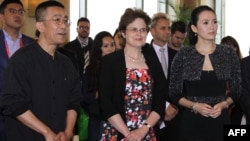Australia's most high-ranking diplomat has acknowledged Canberra's relationship with its largest trading partner, China, is enduring a period of complexity and difficulty. The candid comments from the head of the Australian Foreign Affairs Department came during a parliamentary hearing in Canberra.
Relations between Australia and China are rarely without problems or tensions. In recent months, Canberra introduced its biggest overhaul of intelligence laws in decades to try to combat foreign interference in domestic politics.
While the Prime Minister Malcolm Turnbull spoke of "disturbing reports about Chinese influence" in Australia, he has insisted the new measures were not aimed at one particular country. However, Beijing reacted with displeasure, and said it had no intention of meddling in Australia's internal affairs.
Those tensions still persist, according to Australia's most senior public servant.
Frances Adamson, the head of Australia's Department of Foreign Affairs and Trade, said the bilateral relationship is often fraught with turbulence.
"Our relationship with China there are, whichever government in Australia, there are periods when the Chinese are not completely in agreement with everything that we might want to do in our national interest. It is important for us to assert that," said Adamson.
Another area of tension is the South China Sea. Australia always has advocated for freedom of navigation in international waters in the strategic waterway.
But China claims sovereignty over most of the South China Sea, including a group of small islands, directly challenging the territorial claims of its neighbors — Malaysia, Vietnam, the Philippines and Taiwan.
Australian defense minister Marise Payne said Canberra will continue to assert its rights in the region.
"Certainly in the last 12-18 months, two years really, we have made some quite significant increases in our activity in the region, and last year the Australian Defense Force executed the largest joint task group that we have had in decades through the region," said Payne.
Canberra must tread a delicate diplomatic line between China, its largest trading partner, a relationship that has underpinned recent Australian prosperity, and its long-standing military alliance with the United States that dates back to the early 1950s.




